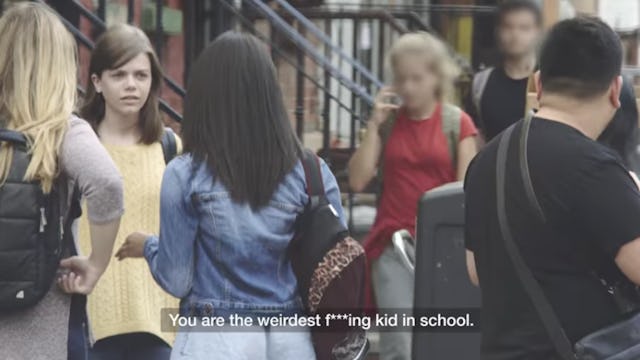This Video Will Make You Think Twice Before You Leave That Rude Comment Online

Why do we say things online that we would never say in real life?
What would you do if you saw someone fat-shaming a woman in a cafe? Telling a gay couple they should kill themselves? Calling a Muslim woman a terrorist? Would you step in?
A new PSA, released for Bullying Prevention Month, is asking that question, as well as pointing out the stark difference between behaviors we allow to happen online versus the ones we allow in real life.
The video, called In Real Life: An Offline Experiment, uses actors as the bullies and their victims. The bullies use actual comments that were said on social media, things like “I fucking hate fat people,” “Homosexuality is a disease” and “All Muslims are terrorists.” In these real-life scenarios, passers-by get involved and stand up for the people being harassed. Online, though? It’s often a different story.
Image via In Real Life / YouTube
Image via In Real Life / YouTube
The PSA was created by Monica Lewinksy in a partnership with ad agency BDDO New York, and it’s meant to make people think about why our behavior differs so much between online and off.
Lewinsky told People magazine that the video shows “how people hiding behind a screen will write something they’d never say to someone’s face — and what that says about the inhumanity of their actions. It’s a stark and shocking mirror to people to rethink how we behave online versus the ways that we would behave in person.”
Image via In Real Life / YouTube
She also wants to show how bullying can be interrupted when people stand up for one another.
“The people in the video who overhear the comments were not actors,” she said. “They were not aware the actors were reading real social media posts. Their reactions and actions were real. It was heartening to see real New Yorkers stand up for people. I especially loved that most intervened without bullying the bully, but instead standing up for the targets.”
Image via In Real Life / YouTube
What makes the video so powerful is how relatable it is. In 2017, who hasn’t had something nasty written about them online?
When I was still in college pursuing my journalism degree, I submitted an article to a local weekly newspaper in my town. I was shocked and delighted when it was printed. And just as quickly, I was heartbroken when someone commented on my first ever published story, “Terrible article. Step it up.”
I had already broken what I would learn is rule number one in newsrooms: Don’t read the comments. But even though we know the comments sections are filled with trolls and trash, it doesn’t stop us from looking. People have said some truly terrible things about me in those comments sections. One man told me to find a job kicking kittens. A woman wondered why anyone would pay me to do my job. To my face, people compliment my writing. But online? They say vitriolic things unlike anything anyone has ever said to my face.
Image via In Real Life / YouTube
Put a keyboard and a screen between two humans, and suddenly, the humanity is no longer there. We say things online that would be absolutely unacceptable to say in real life, but why? Videos like In Real Life should make us think about why we find this acceptable, and maybe the internet will be less of a safe space for bullies.